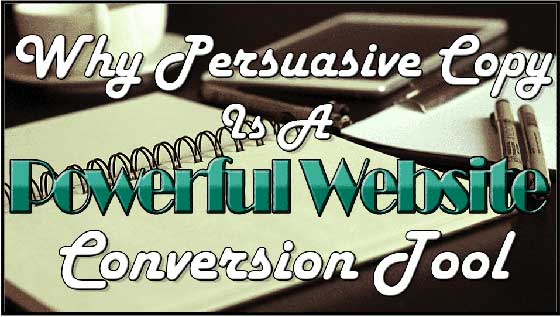Converting visitors into qualified sales leads is the primary reason why most companies build websites. Sure, there are other factors to take into account, writes George Glover in Business2Community. These could be building thought leadership, maintaining globally-accessible business hours or simply showcasing your message, but—let’s face it—the purpose of having a website is to increase your sales. To do that, it’s essential that your website converts visitors into leads. Persuasive copy is a powerful website conversion tool for achieving this, for several reasons:
Table of Contents
ToggleGrabs Attention
The pen is mighty, and potent words have been used since the beginning of time to grab attention. Persuasive copy captures the user’s imagination and interest by telling stories and painting mental images. Imagination increases his (or her) desire, and desire converts leads. Good copy is borne out of listening. When you know what your prospect is looking for, it’s possible to give it to him in a language he understands.
Primes The Prospect
The study of cognitive psychology focuses on harnessing the power of the mind, and the way to do that is by “priming” through the use of stimuli. Persuasive copy subtly plants the desire for the product in the prospect’s mind, and then influences him towards taking the action you want.
Highlights A Need
Abraham Maslow’s hierarchy of needs is a logical approach to the sequence in which humans typically need—or want—certain things. Regardless of what level of hierarchy your product fulfills, well-written, persuasive copy can highlight a need the prospect has. Once he realizes the need exists, it’s a short step to providing a solution to a problem he didn’t know he had.
Educates The User
Humanity holds education in high esteem, and that gives copy that seeks to educate an edge over anything that seeks to “tell” or “sell.” If you craft persuasive website copy that informs the user and adds value by offering insights and expertise, it becomes educational by nature. A vendor who provides educational content is likely to be chosen ahead of one who doesn’t. In this way, copy becomes a tool for converting website visitors into leads through providing education.
Aligns To The Buying Cycle
Website copy that aligns with the buying cycle of your target audience is persuasive when prospects can relate to it. If copy focuses on one stage of the cycle it’s less likely to convert, because only buyers in that stage will find it relevant. To be truly persuasive, copy needs to leverage each stage of the cycle so buyers at every point can relate to it. That way, it “tilts” the client’s perspective to where you want it to be, according to HubSpot’s Meghan Keaney Anderson.
Provides Authoritative Reasoning
Anyone can produce mediocre copy and it’s unlikely to convert a discerning visitor into a prospect. For copy that converts, it needs to indicate a voice of authority, reasoning and knowledge by:
- Optimizing the use of in-depth information
- Providing detailed analysis of product features
- Explaining benefits and disadvantages of purchasing
To be authoritative, persuasive copy avoids the use of jargon and hyperbole. It doesn’t matter whether you use a formal business tone or a casual one, as long as you don’t sound like you’re “talking down” to the user. Instead, you’ll be raising him up to the same level of authority as you. And people love that.
Offers Pricing
For web copy to convert, it needs to anticipate reader questions, says Ann Handley in the 9 Qualities of Good Writing. Whether these apply to the pricing or the reason for its absence (such as the need for individual estimates), persuasive copy establishes the value of the product within or beyond the price point. How often have you responded to a website that gave no indication of how much an item would cost? Probably not too often, because it smacks of some kind of trickery.
Justifies Closing The Deal
Buyers raise objections. It’s a fact of life, and smart marketers take this into account when they’re formulating website copy that’s designed to convert. Your prospect needs to feel he’s made a well-informed choice; it’s not enough to simply tell him what the product costs—you need to justify the value he’s getting by:
- Explaining the quality
- Presenting your philosophy
- Clarifying the warranty
Used correctly, persuasive copy helps to move your prospect to the point of making a purchase by correctly framing the arguments that lead him to the solution. Written by J. A. Conger in a 1998 Harvard Business Review, this principle preceded website copy by a significant period but is no less true because of that.
Overall, persuasive copy works to whet your user’s appetite for your product to the point that he is ready to part with his money, invest his trust and jump on for the ride.











